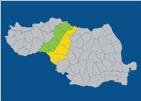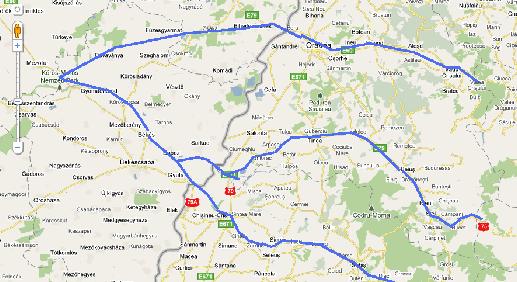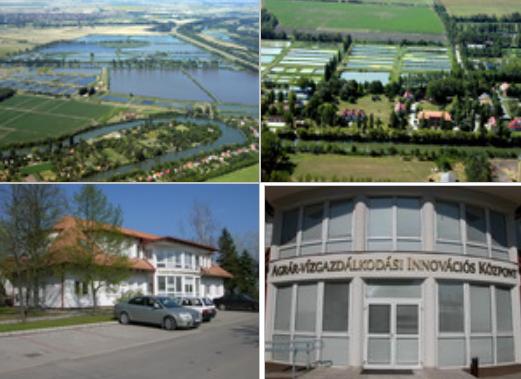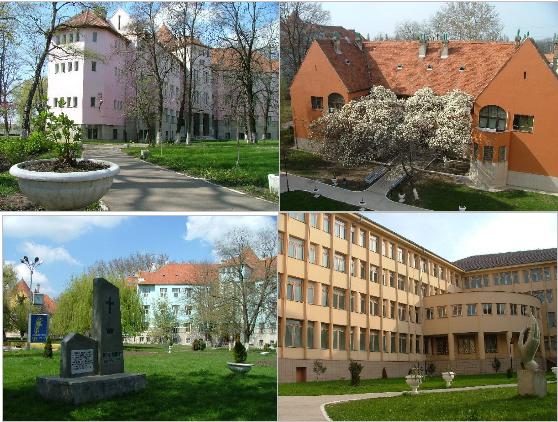 |
Magyarország-Románia
Határon Átnyúló Együttmüködési
Program 2007-2013 Programul De Cooperare
Transfrontalieră
Ungaria-România 2007-2013 |
Európai Unió
Európai Regionális Fejlesztési Alap Uniunea Europeană
Fondul European de Dezvoltare Regională |
 |
Proiect HURO 0901/086
Studies on accumulation properties of
pharmaceuticals and metabolites in the ecosystem
of Körös River basin,
Acronym: PHARMARIVER
| SUMMARY PROJECT DESCRIPTION
|
| Rationale and background
|
Intensive use of different xenobiotics including pharmaceuticals leads to the growth of persistent pollutants quantities in the natural and waste waters as well as in sediments. So these compounds might accumulate in the different aquatic organisms also. Among others, the contaminant effect of medicines and endocrine disruptors has become evident only in the last years. Monitoring of these contaminants that were previously neglected, moreover, often considered harmless, that, however, have significant effects, has become possible due to the more up-to-date analytical methods and instruments. There are several persistent compounds, like antibiotics and non steroid inflammatories which cannot eliminate neither by wastewater purification, nor by drinking water treatments and thus they present in the environment as.
|
| Objectives (general and specific)
|
General objective of the project is a complex study on the phamaceutical pollution of the Körös Rivers Basin arround of Romanian-Hungarian border. Our specific aims are pointed to the most frequently used antibiotics and non steroid inflammatories in the human and animal therapheutics.
|
| Cross-border character and impact
|
The Hungary-Romania Cross-Border Co-operation Programme 2007-2013, aim is to enhancing the joint social and economic development of the Hungarian-Romanian border area.

The Körös Rivers are cross the Romanian - Hungarian border at several points and the main basin might found in Romania. As Körös falls into Tisza River basin of Körös Rivers is a part of the basin of Tisza River which is the second important river of Hungary. Thus pollutions including phamaceutical might affect bought contries especially arround of the borderlands. By these reasons results of the project might give beneficial knowledges to boht contries.
Crişul Repede (Romanian Crişul Repede; Hungarian Sebes-Körös) is a river in Bihor county, Crişana, Romania and in southeastern Hungary (Körösvidek). Together with the rivers Crişul Alb (White Criş) andCrişul Negru (Black Criş), it makes up the Three Criş rivers ("Cele Trei Crişuri"). These are considered the main rivers in the Crişana region of Romania. The Crişul Repede river runs through the city of Oradea, the capital of Bihor county. It flows into the Körös (Criş) river near Gyomaendrőd, in Hungary.
The Crişul Negru (Romanian; Hungarian Fekete-Körös) is a river in western Romania (Transylvania) and south-eastern Hungary (Békés county). The river starts at the junction of headwaters Crişul Poienii and Crişul Băiţei in the western Apuseni Mountains. It flows through the towns Ştei and Beiuş in Romania. One its tributaries is the small Roşia River. Crossing the border of Hungary the river, now called Fekete-Körös, joins the Fehér-Körös a few kilometres north from Gyula to form the Körös river.
The Crişul Alb (Romanian; Hungarian Fehér-Körös) is a river in western Romania in the historical region of Transylvania and south-eastern Hungary (Békés county). Its source is in the southern Apuseni Mountains. It flows through the towns Brad, Ineu, Chişineu Criş in Romania, and Gyula in Hungary. Crossing the border of Hungary, the river, now called Fehér-Körös, joins the Fekete-Körös a few kilometres north from Gyula to form the Körös River.
Körös (Hungarian: Körös, Romanian: Criş, German: Kreisch) is the name of a 195 km long river in eastern Hungary. It is formed at the confluence of the rivers Fehér-Körös ("White Körös" Romanian:Crişul Alb) and Fekete-Körös ("Black Körös", Romanian: Crişul Negru) near Gyula (Romanian: Ghiula). The Sebes-Körös ("Rapid Körös", Romanian: Crişul Repede) flows into the river Körös nearGyomaendrőd. All three rivers have their source in the Apuseni Mountains, in Romania. The Körös flows into the Tisza River near Csongrád.

|
| Target groups
|
The main target groups are the water research groups of the universities and research institutes, experts of wastewater purrification and the legal experts of the environmental ministries. The population of the studied area is also target group of this project in wider sense.
|
| Short summary of the project activities, responsible partners and timeframe
|
Managements and researchers of Oradea University and HAKI will organise a kick of meeting at the beginning of the project followed by fixing of the sampling points in the field.
Two sampling (late spring, and early autumn) will be carried out to survey of pharmaceuticals in water, sediment, two fish species and indicator macrophytes with the working knowledge of lie of the lands. Basic chemical constituents (pH, oxygen, nitrite, nitrate, ammonia, phosphates, and KOI) will be determined by standard methods. Fish will be catch by electric fishing and composition of the fish fauna will be evaluated.
Analysis of the pharmaceutical compounds will be carried out by different instrumental methods in the laboratory of Oradea University. Primarily, screenings of the different antibiotics with ELISA tests will be conducted to screen a large sort of medicines (tetracycline, sulphonamide and nitrofuran) in laboratories of both institutions. The concentrations of the most abundant antibiotics (e.g. oxitetracycline, and basic nitrofuran compounds) will be studied by HPLC with fluorimetric detection.
Non steroid inflammatories (ibuprofen, ketoprofen, naproxen, diclofenac and indomethacin) will be analysed by GS-MS method in gas-chromatographic laboratory of HAKI.
Evaluation of the results, reports and publications will be jointly carried out by the researchers of the project.
|
| Enumeration of the activities
|
| Hungary
|
Romania
|
| 1. Project preparation: Visit to the Department of Chemistry and Biology of Oradea University with the idea of this project. Preparation of the project proposal together. Hungarian translation of the project proposal.
|
1. Project preparation: Visit to the HAKI. Preparation of the project proposal together. Romanian translation of the project proposal.
|
| 2. Management activities: HAKI gives the research and economical project leader. Kick off and closing meeting will be oganised by HAKI. Hungarian part of the project will be organised by program leader of HAKI. Economical reports of HAKI will be carried out by economical leader of the Hungarian partner. Economical reports will be summerised by HAKI.
|
2. Management activities: Program leader of the Oredea University will be organised the Romanian part of the project. Economical reports of Oradea University will be carried out by economical leader of the Romanian partner and send to Hungary.
|
| 3. Communication: Public and research publications will be carried out together with the Romanian partner. Hungarian part of the project home page will be prepared by the researchers of HAKI and English part together with Romanian partner. Periodical and final reports will be prepared together with the Romanian partner and summerised by project leader.
|
3. Communications: Public and research publications will be carried out together with the Hungarian partner. Romanian part of the project home page will be prepared by the researchers of Oradea University and English part together with Hungarian partner. Periodical and final reports will be prepared together with the Hungarian partner.
|
4. Research work:
Fixing of the sampling points in the field and sampling will be carried out together with the Romanian partner.
Evaluation of the fish fauna will be done by HAKI group.
One antibiotics will be analysed by HAKI with ELISA tests.
Chromatographic analysis of antibiotics and non steroid inflammatories will be carried out by researchers of HAKI.
|
4. Research work: Fixing of the sampling points in the field and sampling will be carried out together with the Hungarian partner.
Basic chemical compartments will be analysed by research group of Oradea University.
Two antibiotics will be assayed by research group of Oradea University with ELISA tests.
Evaluation of the results will be carried out by researchers of HAKI.
|
|
PARTNERSHIP
| Lead Partner
|
| Name of the institution
|
Institute for Fisheries, Aquaculture and Irrigation
|
| Address
|
Hungary, Szarvas, 5540, Annaliget 8.
|
| Legal status
|
body governed by public law
|
| County / Region
|
Békés
|
Short Presentation
Institutional fisheries research started in Hungary ninety years ago, when the "Royal Experimental Station for Fish Physiology and Waste Water Purification" was established in 1906. The experimental station was at Budapest at that time, and after several reorganisations and relocation, the central fisheries research institute found its final place at Szarvas in 1953. The city is located in the south-eastern part of Hungary, in the Körös River Valley where fish culture has a long tradition. The station became an internationally acknowledged institute after the completion of a FAQ/CIN supported development project in 1980. The Fish Culture Research Institute (Hungarian acronym: HAKI), that belongs to the Ministry of Agriculture is a leading institute in aquaculture and fisheries research in Hungary. However there are several other institutions that are carrying out research and development work in aquaculture and fisheries, like Debrecen-. Gödöllö-, and Keszthely Agricultural Universities; Balaton Limnological Research Institute, Tihany; Veterinary Research Institute, Budapest; and Agricultural Biotechnology Center, Gödöllo to mention only the major ones. HAKI, however is a center of excellence on aquaculture and fisheries research that is implementing multidisciplinary research programme with the main aim to provide scientific basis for the development of fish culture technologies under various conditions from natural waters to intensive systems.
Photo Galery

http://www.haki.hu/index.cgi?nyelv=en
| Project Partner
|
| Name of the institution
|
University Oradea
|
| Address
|
Romania, Oradea, 410087, Str. Universitatii, nr. 1
|
| Legal status
|
body governed by public law
|
| County / Region
|
Bihor
|
Short Presentation
The traditions of higher education in Oradea, metaphorically speaking, go back to time immemorial. This year (2011) there are 231 years since the inauguration of higher education in Oradea and 48 years of continuous higher education in Oradea.
Today, the University of Oradea is an integrated institution of higher education of this kind, comprising 18 faculties. The mission of the University of Oradea is to train and educate on a large scale both the students and also the high education graduates, as well as to approache certain domains of science and technology at high level. The structure of the University contains academic education, postgraduate education and scientific research.
Inside the University of Oradea the education and research activity is developing in the area of natural and physical sciences, as well as in the area of social and human sciences, covering the following: Mathematics, Physics, Chemistry, Sciences of Life, Agricultural Sciences, Medical Sciences, Technological Sciences, Economical Sciences, Geography, History, Juridical Sciences and Law, Linguistics, Pedagogy, Political Sciences, Psychology, Letters and Arts, Sociology, Philosophy. The educational process is based on the curricula for long term studies, short term studies, postgraduate’s studies, master, doctoral studies and programs of continuous education and Distance Open Education. The University of Oradea adopted the European System of Transferable Credits, facilitating the didactical process.
Photo Galery

http://www.uoradea.ro/
PROJECT EQUIP MEMBERS
|
|
Project role
|
NAME/position
|
Experience/years
Domain of activities
|
Afiliation
|
Contact
|
| 1.
|
Project leader
|
Senior Researcher dr. Gyöngyössiné Papp Zsuzsanna
|
35
Chemistry
|
Institute for Fisheries, Aquaculture and Irrigation, Hungary, Szarvas
|
gyongy@haki.hu
|
| 2.
|
Hungarian coordinator
|
Researche fellow dr. Jakabné Sándor Zsuzsanna
|
15
Chemistry
|
Institute for Fisheries, Aquaculture and Irrigation, Hungary, Szarvas
|
sandorz@haki.hu
|
| 3.
|
Member
|
Researche fellow dr. Györe Károly
|
35
Biology
|
Institute for Fisheries, Aquaculture and Irrigation, Hungary, Szarvas
|
jozsav@haki.hu
|
| 4.
|
Member
|
Researche fellow Bíró Janka
|
6
Biology
|
Institute for Fisheries, Aquaculture and Irrigation, Hungary, Szarvas
|
biroj@haki.hu
|
| 5.
|
Financial coordinator in Hungaria
|
Deputy director for finances Valentinyi Károly
|
29
Financial
|
Institute for Fisheries, Aquaculture and Irrigation, Hungary, Szarvas
|
valentk@haki.hu
|
| 6.
|
Roumanian coordinator
|
Assistant professor Dr. Alexandrina Fodor
|
20
Chemistry
|
University of Oradea, Romania, Oradea
|

afodor@uoradea.ro
|
| 7.
|
Member
|
Lecturer Anda Ioana Gratiela Petrehele
|
11
Chemistry
|
University of Oradea, Romania, Oradea
|

pcorinamara@yahoo.com
|
| 8.
|
Member
|
Assistant professor Dr. Diana Cupşa
|
16
Biology
|
University of Oradea, Romania, Oradea
|

dcupsa@uoradea.ro
|
| 9.
|
Member
|
Lecturer Dr. Adriana Petrus
|
11
Biology
|
University of Oradea, Romania, Oradea
|

adrianavan@yahoo.com
|
| 10.
|
Financial coordinator in Roumania
|
Economist Lenuţa Emilia Vid
|
10
Financial
|
University of Oradea, Romania, Oradea
|

evid@uoradea.ro
|
|










